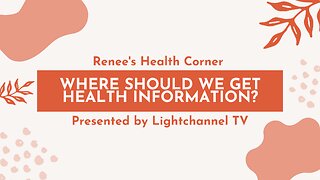Premium Only Content

Health Nugget - Why not milk and cheese and what to use instead ? with Dr. Walt Cross
Cheese is made from fermented milk. The whey is separated from the curd. From the soft curd, cream cheese is manufactured (or cottage cheese) and if allowed mature, hard cheese are manufactured. In the maturing process, bacteria utilize the sugars and other nutrients in the milk until maturity which means they are no longer able to metabolize the nutrients. The sugar that is metabolized in the milk is lactose and lactose is converted to glucose and galactose. The glucose is used for energy by the bacteria but they lack the enzyme to metabolizes the galactose. Human beings that are weaned no longer produce the enzyme which metabolizes galactose and so galactose is a foreign substance which has been associated with ovarian cancer and senile cataracts as well as other disorders.
The protein in cheese and dairy products is casein, which requires rennin in order to successfully digest it, and humans do not have sufficient rennin so digestion is incomplete and instead of amino acids as end product, short chain polypeptides end up in the bloodstream. These have been associated with allergic reactions as the body creates antibodies against the amino acid sequences. Many sclerotic diseases as well as allergic asthmas, bronchial and ear infections, are associated with this protein as well as diabetes type I.
The fat in cheese is saturated fat and cholesterol but since it is subject to maturation in the air these fats are oxidized particularly since animal products do not contain antioxidants. These fats are carcinogenic and oxidized cholesterol is considered the most dangerous form of cholesterol for cardiovascular disease. Digestion times for cheese in view of their protein composition are very long and require excessive acid production in the stomach in order to optimize pepsins activity. Cheese thus leads to acidosis and considering all the above, it should be regarded as totally unfit for food.
Dairy products in general will have the same negative effects as cheese, but in addition, the sugar lactose has not yet been fermented and thus has to be broken down by enzymes in the human body. After weaning, the enzyme lactase is deactivated to a greater or lesser extent in different human races. People of European origin generally tolerate lactose better than Asian, Hispanic or African nations because they still produce the enzyme lactase to some extent after weaning, whereas the other nations produce so little that they are up to 95 or even 100% lactose intolerant. Lactose intolerance means that lactose passes to the colon undigested and causes diarrhea and colonic disorders. Even in Europeans this is true to a limited extent. Moreover, bacteria will break down the lactose in the colon and the resultant galactose is considered a foreign substance since Europeans lack the enzyme to convert it to glucose after weaning. So dairy products in general are not the most wholesome.
-
 9:58
9:58
Light Channel TV
1 year agoRenee's Health Corner: Where Should We Get Health Information?
273 -
 LIVE
LIVE
I_Came_With_Fire_Podcast
8 hours ago🔥SPECIAL RELEASE🔥 Inflation Reduction Act: American Seniors Get SLAMMED!!
143 watching -
 DVR
DVR
vivafrei
7 hours agoD.C. Gulag Jan. 6 Prisoners Release Watch!
135K73 -
 1:49:14
1:49:14
Redacted News
6 hours agoTrump is Back! Congress Uncovers New Biden Crimes One Day After He Leaves D.C. | Redacted
138K213 -
 2:09:53
2:09:53
Benny Johnson
6 hours ago🚨President Trump LIVE Right Now Making MASSIVE Announcement At White House News Conference
247K313 -
 2:04:10
2:04:10
Revenge of the Cis
7 hours agoEpisode 1433: Retribution
99.2K13 -
 1:42:50
1:42:50
The Criminal Connection Podcast
11 hours ago $0.77 earnedEddie Hearn talks JOSHUA vs FURY, Working With Frank Warren & The Truth About Turki Alalshikh!
44.1K2 -
 1:00:25
1:00:25
In The Litter Box w/ Jewels & Catturd
1 day agoGolden Age | In the Litter Box w/ Jewels & Catturd – Ep. 724 – 1/21/2025
135K71 -
 57:42
57:42
The Dan Bongino Show
14 hours agoHE'S BACK! (Ep. 2405) - 01/21/2025
1.36M2.35K -
 46:19
46:19
Candace Show Podcast
8 hours agoUH-OH! Elon’s Viral Salute Steals The Inauguration Show | Candace Ep 136
146K402